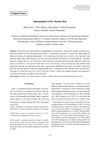 August 2023 in “Medical Hypotheses”
August 2023 in “Medical Hypotheses” Metformin, usually used for diabetes, can also help treat hair loss from alopecia areata due to its ability to reduce inflammation and stimulate new hair growth.
 August 2023 in “Dermatology and Therapy”
August 2023 in “Dermatology and Therapy” Experts recommend personalized treatment plans for best outcomes in managing Alopecia Areata.
 July 2023 in “Skin Research and Technology”
July 2023 in “Skin Research and Technology” Baricitinib combined with other immune therapies may safely and effectively treat severe scalp hair loss.
 June 2023 in “Frontiers in Medicine”
June 2023 in “Frontiers in Medicine” Protein tyrosine kinases are key in male pattern baldness, affecting skin structure, hair growth, and immune responses.
 May 2023 in “Journal of Clinical Medicine”
May 2023 in “Journal of Clinical Medicine” New understanding and treatments for hair loss are improving, but more research is needed.
 May 2023 in “Frontiers in Immunology”
May 2023 in “Frontiers in Immunology” Treg cell-based therapies might help treat hair loss from alopecia areata, but more research is needed to confirm safety and effectiveness.
 January 2023 in “Biomedicine & Pharmacotherapy”
January 2023 in “Biomedicine & Pharmacotherapy” Low oxygen conditions improve how well certain stem cells from embryos can make hair grow longer and faster.
 January 2023 in “Journal of Cosmetic Dermatology”
January 2023 in “Journal of Cosmetic Dermatology” Some children may develop hair loss after having COVID-19.
 December 2022 in “Dermatology and Therapy”
December 2022 in “Dermatology and Therapy” Alopecia areata needs more recognition and better treatment access in Latin America to improve patient care and outcomes.
ILC1-like cells can independently cause alopecia areata by affecting hair follicles.
 March 2022 in “Wound practice & research”
March 2022 in “Wound practice & research” New treatments for alopecia areata show promise, but standardized guidelines are needed.
Different types of sun exposure damage skin cells and immune cells, with chronic exposure leading to more severe and lasting damage.
June 2020 in “Journal of Investigative Dermatology” The symposium highlighted the importance of genetics in understanding and treating complex skin diseases.
April 2019 in “Journal of the Endocrine Society” Sex hormones may be linked to inflammation in Hidradenitis Suppurativa.
January 2019 in “Springer eBooks” Combination therapies might work better for some vitiligo patients, but results vary.
 January 2003 in “Springer eBooks”
January 2003 in “Springer eBooks” Certain genes are linked to type 1 and type 2 diabetes in kids, and changes in these genes can also cause other diabetes-related conditions.
April 2023 in “Chinese Medical Journal” Human hair follicle stem cells help repair tendon injuries.
Protein profiling of forehead skin can help distinguish between frontal fibrosing alopecia and androgenetic alopecia.
November 2022 in “Annals of Translational Medicine” Immune activities and specific genes are important in male pattern baldness.
September 2022 in “Translational Andrology and Urology” Finasteride may cause lasting sexual and mental health issues, and genetic screening could help prevent them.
September 2022 in “Frontiers in Immunology” Anti-androgen therapy may boost immunity but increases injection site pain in vaccinated patients.
 76 citations,
June 2015 in “Journal of biomedical science”
76 citations,
June 2015 in “Journal of biomedical science” Mutations in Gasdermin A3 cause skin inflammation and hair loss by disrupting mitochondria.
 1 citations,
January 2012 in “Journal of The Society of Japanese Women Scientists”
1 citations,
January 2012 in “Journal of The Society of Japanese Women Scientists” Murine hair has specific types of ceramides and glucosylceramides but lacks acylceramides.












